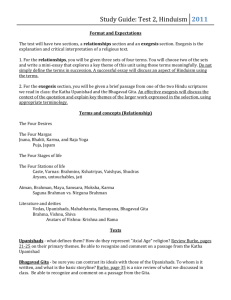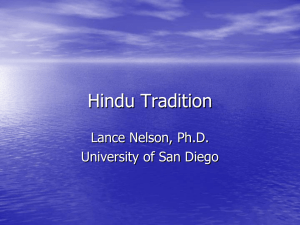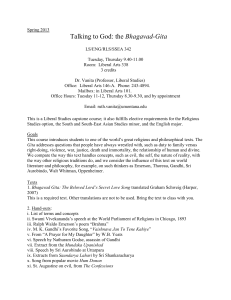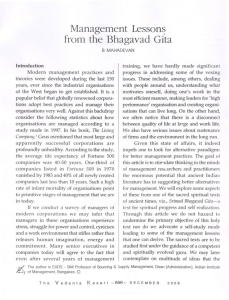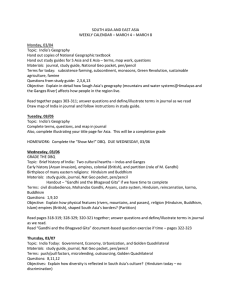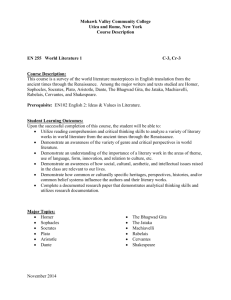Cross Listing Course Form
advertisement
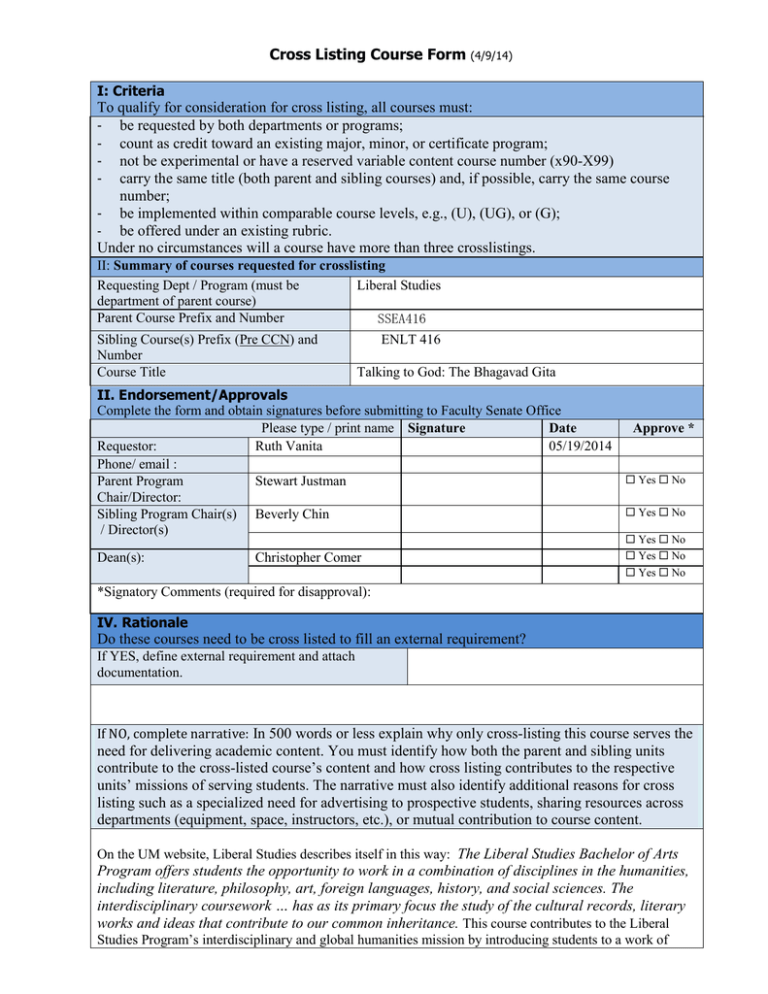
Cross Listing Course Form (4/9/14) I: Criteria To qualify for consideration for cross listing, all courses must: - be requested by both departments or programs; - count as credit toward an existing major, minor, or certificate program; - not be experimental or have a reserved variable content course number (x90-X99) - carry the same title (both parent and sibling courses) and, if possible, carry the same course number; - be implemented within comparable course levels, e.g., (U), (UG), or (G); - be offered under an existing rubric. Under no circumstances will a course have more than three crosslistings. II: Summary of courses requested for crosslisting Requesting Dept / Program (must be Liberal Studies department of parent course) Parent Course Prefix and Number SSEA416 Sibling Course(s) Prefix (Pre CCN) and ENLT 416 Number Course Title Talking to God: The Bhagavad Gita II. Endorsement/Approvals Complete the form and obtain signatures before submitting to Faculty Senate Office Please type / print name Signature Date Approve * Requestor: Ruth Vanita 05/19/2014 Phone/ email : Yes No Parent Program Stewart Justman Chair/Director: Yes No Sibling Program Chair(s) Beverly Chin / Director(s) Dean(s): Christopher Comer Yes No Yes No Yes No *Signatory Comments (required for disapproval): IV. Rationale Do these courses need to be cross listed to fill an external requirement? If YES, define external requirement and attach documentation. If NO, complete narrative: In 500 words or less explain why only cross-listing this course serves the need for delivering academic content. You must identify how both the parent and sibling units contribute to the cross-listed course’s content and how cross listing contributes to the respective units’ missions of serving students. The narrative must also identify additional reasons for cross listing such as a specialized need for advertising to prospective students, sharing resources across departments (equipment, space, instructors, etc.), or mutual contribution to course content. On the UM website, Liberal Studies describes itself in this way: The Liberal Studies Bachelor of Arts Program offers students the opportunity to work in a combination of disciplines in the humanities, including literature, philosophy, art, foreign languages, history, and social sciences. The interdisciplinary coursework … has as its primary focus the study of the cultural records, literary works and ideas that contribute to our common inheritance. This course contributes to the Liberal Studies Program’s interdisciplinary and global humanities mission by introducing students to a work of world literature that is a part of our common inheritance. This course serves as a Liberal Studies capstone course, because the Bhagavad Gita addresses many of the same questions that ancient Greek, Jewish and Christian philosophers address and with which students discuss in the Liberal Studies introductory sequence (LSH 151/152). For example, Liberal Studies majors read St Augustine in the introductory course, LSH151, and in the present course, they compare St Augustine’s views on evil with the Gita’s perspective on the same subject. The Gita’s impact on modern Western thought has been so great that acquaintance with this text is necessary to cultural literacy. Through supplementary readings from Indian philosophers, such as M.K. Gandhi, Swami Vivekananda, Sri Aurobindo and Adi Shankaracharya, students become acquainted with the history of interpretation of this text both in India and the West. Liberal Studies offers an Asian Studies option, a Religious Studies option and a South &South-East Asian Studies minor. This course serves students in all three as well as in the general Liberal Studies option. On the UM website, English states its mission thus: The program's aim is to impart to the student an understanding not only of the aesthetic richness of the literatures that have been written in English but also of the historical and cultural forces that have contributed to their making. This course contributes to the mission of English, by enabling students to encounter a work of world literature that has contributed to the making of modern English literature. The works of Indians writing in English, such as Nobel Prize winner Rabindranath Tagore and contemporary award-winning writer Vikram Seth, clearly show this influence. But many European and American authors, including Emerson, Thoreau, T. S. Eliot, W. B. Yeats, Christopher Isherwood, E.M. Forster, Aldous Huxley, have engaged with and written about this text. In the last two decades, English departments worldwide, including UM’s English department, have redefined their mission to include world literature in English and in translation. Indian literature has a history of at least 3500 years, and English students benefit greatly from reading the Bhagavad Gita, which most of them have never encountered before, and which is now available in numerous translations (from 1785 onwards) in English. This course helps English students complete their upper-division requirements. This is a unique course in the state. I have taught this course thrice; it has always been cross-listed with English, and has always drawn significant numbers of English students; it needs to be advertised to these students who might otherwise miss it if it is listed only as Liberal Studies and not also as LIT. The course is interdisciplinary in this way: it addresses the history of ideas and of East-West cultural interplay, which it is Liberal Studies’ mission to explore. It also addresses the aesthetic richness of a text that is widely read in English and influential for the English canon, by exploring tropes (such as the tree, the sun, the chariot), genre (dialogue, invocation, praise-text), and idioms. This latter enterprise is the mission of English. V. Syllabus Spring 2013 Talking to God: the Bhagavad-Gita LS/ENG/RLS/SSEA 342 Tuesday, Thursday 9.40-11.00 Room: Liberal Arts 338 3 credits Dr. Vanita (Professor, Liberal Studies) Office: Liberal Arts 146-A. Phone: 243-4894. Mailbox: in Liberal Arts 101. Office Hours: Tuesday 11-12, Thursday 8.30-9.30, and by appointment Email: ruth.vanita@umontana.edu This is a Liberal Studies capstone course; it also fulfills elective requirements for the Religious Studies option, the South and South-East Asian Studies minor, and the English major. Goals This course introduces students to one of the world’s great religious and philosophical texts. The Gita addresses questions that people have always wrestled with, such as duty to family versus right-doing, violence, war, justice, death and immortality, the relationship of human and divine. We compare the way this text handles concepts, such as evil, the self, the nature of reality, with the way other religious traditions do, and we consider the influence of this text on world literature and philosophy, for example, on such thinkers as Emerson, Thoreau, Gandhi, Sri Aurobindo, Walt Whitman, Oppenheimer. Texts 1. This is a required text. Other translations are not to be used. Bring the text to class with you. 2. Hand-outs: i. List of terms and concepts ii. Swami Vivekananda’s speech at the World Parliament of Religions in Chicago, 1893 iii. Ralph Waldo Emerson’s poem “Brahma” iv. M. K. Gandhi’s Favorite Song, “Vaishnava Jan To Tene Kahiye” v. From “A Prayer for My Daughter” by W.B. Yeats vi. Speech by Nathuram Godse, assassin of Gandhi vii. Extract from the Mundaka Upanishad viii. Speech by Sri Aurobindo at Uttarpara ix. Extracts from Saundarya Lahari by Sri Shankaracharya x. Song from popular movie Hum Donon xi. St. Augustine on evil, from The Confessions xii. “Kurai Ondrum Illai,” Tamil Hymn to Sri Krishna Requirements Students are required to (a) attend classes regularly. As the text is a difficult one, this is very important. Please inform me in advance if you are unable to attend a class. More than three absences not explained to my satisfaction will result in halving your grade for attendance and class participation, and five or more absences will result in a zero for attendance; leaving early or coming late without explanation will be treated as an absence. (b) hand in a thoughtful typed question or comment at the end of every class on the text that is to be discussed in class that day. Handwritten questions will not receive credit. Attendance may sometimes be given on the basis of these questions. If you are ever unable to hand in a question, it is your responsibility to tell me this and to have yourself marked present. (c) keep up with the assigned reading, bring the texts to class, and participate in class discussions. (d) Complete quizzes and other assignments, and take the mid-term and final exams (e) write a paper. Topics will be given in advance. (f) Check UM email regularly, especially the day before class. I send out notifications and changes by email. UM policy forbids me to write to you on any email address other than the UM one. The best way to communicate with me is by email. Grades Class attendance and participation will be worth 25%, quizzes 20%, the mid-term and the final exams 20% each, the paper 15%. Late papers will not be accepted. Opportunities for extra credit: 2 points for attending the presidential lecture on Gandhi by Leela Gandhi on March 4, and writing a one-page response to it (to be given to me in class on March 5); 1 point for attending the Indian classical music performance by Aditya Prakash on the evening of March 9. Quizzes on the texts and on information provided in class may be given according to schedule or unexpectedly. Quizzes can be made up within the week (not more than twice in the semester), but not later. To make up a quiz, speak to me after class or email me to make an appointment. Plagiarism or academic dishonesty of any kind, in any assignment, will result in your failing the class and may also result in other penalties such as expulsion from the University (for further details, refer to the section on Academic Misconduct in the Student Conduct Code). If you have any condition, such as a physical or learning disability, that will make it difficult for you to complete the work as I have outlined it, please notify me in the first week of class. Reading Schedule This schedule is tentative. It is your responsibility to keep up with any changes and obtain any hand-outs given in class on any day that you are absent. Readings listed for a particular day are to be read before coming to class on that day, e.g. come to class on February 12, having read Chapter 1 of the Gita. January 29 Explanation of syllabus, and introduction to the course. January 31 Background: Hindu doctrine and practice. February 5 Read Swami Vivekananda’s speech and “From the Mundaka Upanishad”. Background: Hindu philosophy; Vedas & Upanishads; approaches to the Gita; this translation. February 7 Read the list of terms and concepts. Background: the Mahabharata. Read Note on the Mahabharata. February 12 Read Gita, Chapter 1. February 14 Read Gita, pp. 35-45 and Emerson’s poem, “Brahma.” Quiz on background. February 19 Read Gita, pp. 46-56 and “M. K. Gandhi’s Favorite Song.” February 21 Read Gita, Chapter 3, and “From ‘A Prayer for My Daughter’ by Yeats” February 26 Read Gita, Chapter 4 and Speech by Nathuram Godse. Quiz on Chapters 1-3. February 28 Read Gita, Chapter 5 March 5 Read Gita, Chapter 6. March 7 Read Gita, Chapter 7. March 12 Read Gita, Chapter 8 and Vivekananda’s letter written shortly before his death. Quiz on Chapters 4-7. March 14 Review March 19 Mid-term exam March 21 Read Gita, Chapter 9 and Extracts from Sri Aurobindo’s speech at Uttarpara. March 26 Read Gita, Chapter 10, “Extracts from Saundarya Lahari” March 28 Read Gita, pp. 150-160. Spring Break April 1-5 April 9 Read Gita, pp. 160-68. Quiz on Chapters 1-11. April 11 Read Gita, Chapter 12. April 16 Read Gita, Chapter 13. April 18 Read Gita, Chapter 14 and “Song from popular movie Hum Donon” April 23 Read Gita, Chapter 15. April 25 Read Gita, Chapter 16 and “St. Augustine on evil, from The Confessions” Quiz on chapters 12-15 April 30 Read Gita, Chapter 17 Quiz on Chapters 1-16. May 2 Read Gita, pp.219-232 May 7 . May 9 Read Gita, pp. 233-42, Tamil hymn to Sri Krishna, Sri Aurobindo on Chapter 18 Quiz on Chapters 17-18. Paper due in class. Final Examination Monday, May 13, 8.00- 10.00 a.m. VI. Justification for third crosslisting: In 500 words or less describe the extenuating circumstances making a third course necessary. The Bhagavad Gita is a major scripture of Hinduism which is the religion of one-sixth of humanity today. This course examines the debates around the production and reception of this text, and its varying interpretations by different schools of Hindu thought. VII Copies and Electronic Submission. After approval, submit signed original, and electronic file to the Faculty Senate Office, UH 221, camie.foos@mso.umt.edu.
